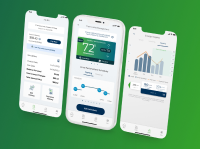What Is Usage Credit Electricity?

A usage credit electricity plan is a type of pricing structure where customers receive a credit on their electricity bill based on how much energy they consume or when they use it. This plan typically offers rebates or discounts for using electricity during off-peak hours, reducing overall consumption, or meeting specific usage targets.
The credit can help lower monthly energy costs, especially for households that are consistently meeting the required amount of energy usage each month. By offering these credits, the plan encourages customers to be more conscious of their consumption patterns, benefiting both their wallets and the energy grid by spreading out demand more evenly.
How Do Usage Credit Electricity Plans Work?
Usage credit electricity plans provide financial incentives that are directly credited to your monthly electricity bill by your retail energy provider (REP). These plans are designed to offer credits based on your electricity consumption and can vary in structure. Here are the primary types of usage credit plans that different REPs may offer:
- Fixed Monthly Credits: Some plans offer a predetermined monthly credit based on your electricity usage. For example, if you use 1,000 kWh per month, the REP may provide a fixed credit, such as $50 or $100, which is deducted from your bill.
- Tiered Consumption Credits: In this structure, the credit amount increases as your energy usage exceeds certain thresholds. For instance, you might receive a larger credit if you surpass 1,000 kWh per month.
- Per-kWh Credits: These plans offer credits calculated on a per-kWh basis. For every kilowatt-hour you consume, a specific amount is subtracted from your monthly bill.
Usage Credit energy plans are designed to help you save on your energy costs while accommodating different consumption patterns. Gexa Energy offers fixed-rate usage credit energy plans intended to help you earn credits that can be applied to your billing cycle as your energy usage increases.
Gexa Energy’s Usage Credit Electricity Plans
Gexa Energy offers several usage credit electricity plans so you can find one that fits your needs.
Gexa Simply Low 12 & 24
Available in 12- and 24-month contracts, this plan offers a Usage Credit of $100 for each billing cycle when your usage is above or equal to 1,000 kWh. The Gexa Simply Low plans are ideal for medium to large homes.
Gexa Basic Plus 12
With this 12-month plan, a Usage Credit of $50 will be included for each billing cycle when your usage is above or equal to 500 kWh. This plan is typically best for small to medium homes.
Who Is a Usage Credit Plan Right For?
- Large Families or Homes: Big families and homes that consistently use a large amount of energy per month can benefit from a usage credit plan. The usage credits can ease the financial burden of higher energy consumption, giving predictable monthly savings.
- Those Concerned About High Summer Electricity Bills: A usage credit electricity plan is particularly beneficial for those concerned about high summer electricity bills because it can help reduce the financial impact of seasonal spikes in energy consumption.
- People Who Monitor Their Energy Usage: A usage credit electricity plan is particularly beneficial for individuals or households that actively monitor their energy usage. Those who monitor their energy usage regularly can help ensure they’re meeting the usage requirement each month.
- Those Who Use the Same Amount of Electricity Each Month: A usage credit electricity plan is beneficial for those who use the same amount of electricity each month because it offers predictable savings and a more consistent pricing structure.
How to Make the Most of
Your Gexa Usage Credit Electricity Plan
Download the Gexa Energy Mobile App
Control your account, check payments, monitor energy usage, and more, all in one convenient location when you download the Gexa Energy Mobile App.
Review the
Bill Estimator Email
Look out for the Bill Estimator email we send part-way through the billing cycle each month letting you know if you’re on track to meet your energy usage to get the usage credit.
Utilize the Power Usage Tracker Tool
With the usage tracker feature in our mobile app, you can take control of your electricity usage by monitoring your consumption throughout the month.
Factors to Consider When Choosing a
Usage Credit Electricity Plan
When determining whether a usage credit electricity plan is right for you, consider the following factors:
Credit Amount: Consider the amount of credit the plan offers and how much electricity you need to use to qualify for it.
Contract Length: You’ll want to determine whether you can commit to the contract length in order to avoid any early termination fees that may apply if you decide to end the contract early.
Your Energy Consumption: Take a look at your typical energy consumption and whether it aligns well with a usage credit plan. If you consistently use enough electricity to qualify for the usage credit, this type of plan could be right for you.
FAQs About Usage Credit Electricity Plans
The energy usage criteria for Gexa’s usage credit plans varies by plan option. For instance, for the Gexa Simply Low and Gexa Energy Plans, you need to use 1,000 kWh or more. For the Gexa Basic Plus 12 plan, your usage must be above or equal to 500 kWh. For the Gexa Premium Plus 12 plan, your usage must be 2,000 kWh or above. It’s always good to refer to the EFL for the specific plan you’re considering.
A usage credit on your electricity bill refers to a specific amount of money or energy allowance applied to reduce the total amount you owe for your electricity consumption. It typically works as a discount or a rebate that is credited to your account and is based on certain conditions or incentives tied to your energy usage.
In addition to usage credit electricity plans, Gexa offers fixed-rate and variable-price energy plans. Gexa also offers special plans for those who own electric vehicles or solar panels. Get started today by browsing and shopping each of the plans available in your area.
Shop Gexa’s Usage Credit Electricity Plans
Gexa Energy purchases renewable energy credits (RECs) from renewable generation resources throughout North America to match 100% of the energy sold under your electric plan. The RECs Gexa purchases represent the renewable attributes of power generated from a variety of renewable energy sources, including, but not limited to, the sun, wind, geothermal, hydroelectric, wave or tidal energy, and biomass or biomass-based waste products, including landfill gas.




